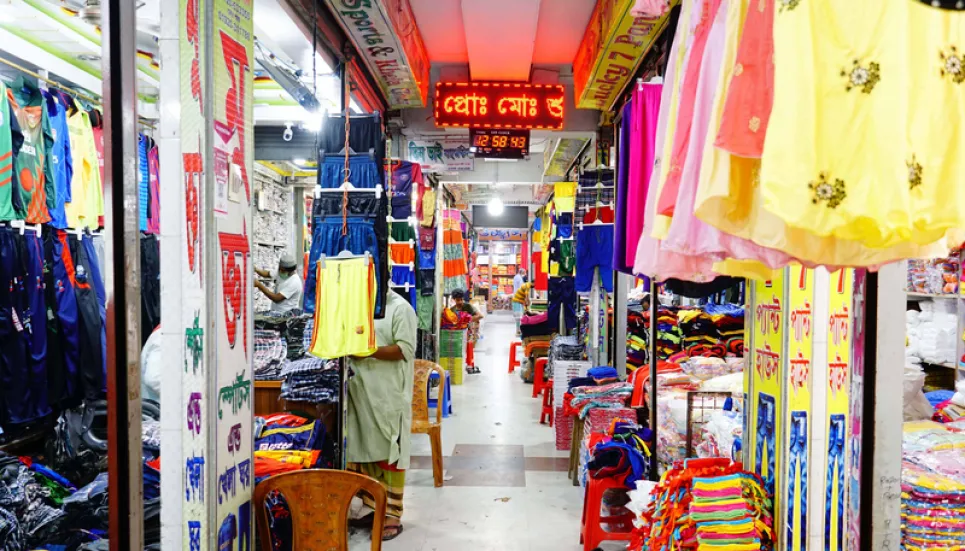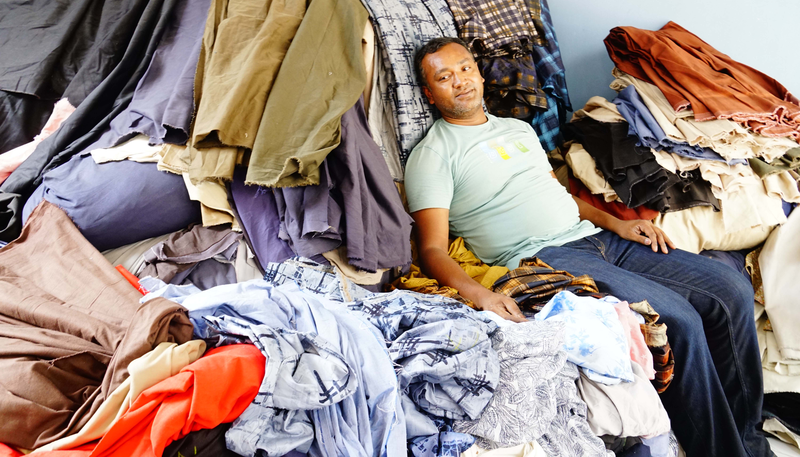
Mohammad Nahian
Alamgir Hossain's hopes to reverse his sales slump by doing more business this Eid season were shattered when his daily sales plummeted to Tk 25,000 from Tk 200,000 due to a nationwide lockdown.
The wholesaler is now stuck in a quagmire, unsure of how to handle operational costs, let alone make a profit.
“After paying rent, staff salary and utility bills, there is nothing left for me to cover my daily expenditures.
Since the second wave of the Covid-19 pandemic began, my business has been facing a crunch as the purchasing capacity of customers is declining,” said Alamgir.
I started to become optimistic again as businesses were allowed to reopen. But most of my products now remain dumped in my warehouse due to a low turnout of buyers. Meanwhile, the bank is pressuring me to pay back a loan of Tk 8 lakh that I took for Eid business,” he added.
Around 100 small garments owners in Keraniganj, who make local jeans pants, T-shirts, Panjabis, children’s clothing etc, share the same story as Alamgir Hossain.
According to Alamgir, roughly six to seven thousand people involved with the clothing business are suffering immensely during the ongoing pandemic.

Only a small number of customers were seen visiting the wholesale clothing stores at Keraniganj on Monday.
Cloth traders in Keraniganj said they were experiencing huge economic losses ahead of Eid-ul-Fitr, which is considered the main business season of the year.
We are going through a very hard time. Last year, we experienced economic losses in our Eid sales. Unfortunately, the same thing is happening again this year,” said Mamun Sikder, a clothes wholesaler at Maksuda Garden City in Keraniganj.
Before the lockdown, we usually sold more than Tk 200,000 worth of products per day. Now our average sale per day is around Tk 10,000 to Tk 15,000,” he said.
Another wholesale trader Aslam Hossain said, “Lockdown has destroyed our business ahead of Eid-ul-Fitr. Before lockdown, I used to sell clothes worth Tk 200,000 to Tk 300,000 per day. Now my sales are around Tk 20,000 to Tk 25,000.”
He also suggested that due to a non-availability of public transports during the lockdown, their main clients were unable to visit their store, “Which is another reason for the decline in our sales before Eid.”
Md Raju, a wholesaler, is unsure how he would repay the bank loan he took to conduct business during Ramadan.
My present income is not sufficient to repay the loan. Bank officials want their money back. I am worried about my future and my family’s as well,” said Raju, owner of Riyan Pant House.
Echoing Raju, another trader Md Harun said that he took a loan of Tk 1,500,000 from a bank for doing business this Eid season but low sales were now worrying him.
We were passing a very busy time before the lockdown. We had several business plans but the lockdown ruined them all. Sales are so low now that there is no need to keep more than one person to look after the store,” said Md Robin, a salesperson at Siam Enterprise.
According to Keraniganj cloth traders, the government-permitted timeframe to keep shopping malls and markets open till 8:00 pm is not sufficient to boost their businesses ahead of Eid-ul-Fitr amid the pandemic.
The government earlier on May 3 decided to extend the ongoing lockdown that started on April 5 until May 16, aiming at curbing Covid-19 spread across the country. Besides, as per the government decision, intra-district public transport services will be allowed to resume from May 6.